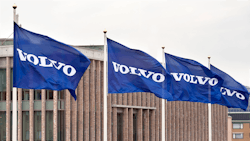Volvo Group, Renault Group, and CMA CGM partner to develop all-new electric vans
Renault Group and Volvo Group are creating a new company to develop a new generation of electrified vans. CMA CGM will also join the two groups in this endeavor. Renault and Volvo are continuing to seek additional investment and business partners, the companies stated in a press release.
See also: Sneak peek: World of Volvo celebrates brand's history and future
“The new company is the startup-minded, unmatched combination of the complementary assets of three champions: a leading truck maker, expert in tailored services, a champion of the global supply chains and a European EV pioneer and LCV leader,” Luca de Meo, Renault Group CEO, said. “All the ingredients are there to come up with something truly unique."
A software-defined family of electric vehicles
The yet-unnamed company will introduce a new family electric vehicles. The company will build the vehicles on a fully electric LCV skateboard platform that will offer high modularity for different body types, according to the release.
The electric van will feature a Software Defined Vehicle architecture. According to the Renault Group website, this allows vehicle upgrades through a centralized architecture and remote updates. With its software defined vehicle architecture, Renault’s goal is to enable “faster development and integration of new features throughout the vehicle life cycle, directly into the cloud.”
Renault touted the possibilities of Software Defined Vehicle architecture, with real-time fault detection, interior personalization, and infotainment system management, although its main benefits include real-time access to new features, enhanced safety, and increased vehicle value.
See also: Volvo's remote programming reduces faults by 51%
Along with Software Defined Vehicle architecture, the vans will onboard capabilities to monitor delivery activity and user business performance, reducing the global cost of usage for the logistic players by 30%, according to the release. The van will offer different battery capacities, including an 800V option.
'Agility of a startup with expertise of three major business groups'
Renault and Volvo will share investments in research and development and bring their existing know-how, services, capital, and industrial footprint to the new company.
As a provider of light commercial vehicles, Renault will bring expertise to develop and manufacture at scale the electric platform that will onboard its first Software Defined Vehicle architecture. Likewise, Volvo has a customer base of logistics companies, a global service network, and experience in uptime and productivity services. Such services will, in combination with the vehicle platform, help provide a complete solution for decarbonized urban logistics, according to the release.
“Volvo Group is keen to continue to offer its customers complete transport solutions that help them decarbonize their value chains,” Volvo Group CEO Martin Lundstedt said. “We see a growing demand for clean, efficient, and safe urban transportation. Partnership and collaboration are key to achieve this."
CMA CGM will help the new company build appropriate solutions that can fit the needs of all players in the transport and supply chain segments based on end-to-end solutions. CMA CGM will also bring its global logistic experience to the solutions and B2B offerings to address the needs of all logistic players.
“This is a comprehensive and innovative partnership,” Rodolphe Saadé, chairman and CEO of the CMA CGM Group, said. “Not only are we investing in this project, but we will also bring our know-how and expertise to ensure inbound and outbound logistics, while some of these vehicles could ultimately be used to decarbonize our fleet. Through this new investment by our Pulse Fund in electric mobility, we are pursuing our commitment to accelerate the decarbonization of our activity and our sector.”
See also: Supply chain leaders reorganizing for resiliency from disruptions
The joint venture is scheduled to start operations early 2024, depending on the completion of all regulatory approval processes. The subsequent entry of CMA CGM in the company is equally subject to the completion of the regulatory approval process. Production is planned to start in 2026.
This project was submitted in response to a France 2030 call for projects, in line with the objectives of innovation and electrification.
The future company is planned to operate under its own corporate identity and will be based in France. Volvo Group, Renault Trucks, and Renault Group have been working together on light commercial vehicles for more than 35 years, materialized by the distribution in both networks of the Renault Master and Trafic commercial vehicles.
About the Author
Jade Brasher
Senior Editor Jade Brasher has covered vocational trucking and fleets since 2018. A graduate of The University of Alabama with a degree in journalism, Jade enjoys telling stories about the people behind the wheel and the intricate processes of the ever-evolving trucking industry.

